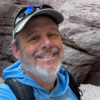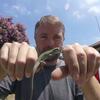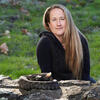Deep Canyon Lecture Series
6 p.m. Feb. 20, 2025
Shells, Science and Students: Using Camera Traps and Radiotelemetry to Monitor Desert Tortoises
Speaker: Dr. William Hoese, Ph.D. California State University Fullerton
Over the past 4 years, undergraduate researchers have used camera traps and radiotelemetry to study desert tortoise ecology at the extreme southern edge of their range at Boyd Deep Canyon Desert Research Center. We discovered this population contains hatchling, juvenile, and adult tortoises. We documented behaviors at burrows with the goal of gaining insight into how these tortoises respond to extreme and changing climate conditions. Tortoise burrows also attract other species, and we are identifying the community that uses these burrows across space and time. Our collaboration highlights the value of student-driven research in advancing conservation science. RSVP here.
6 p.m. Mar. 13, 2025
Rat Poisons Kill A Lot More Than Rats: Rodenticide Exposure in Southern California Snakes
Speaker: Dr. Greg Pauly, Curator of Herpetology at the Natural History Museum of Los Angeles County
Dr. Greg Pauly, Curator of Herpetology at the Natural History Museum of Los Angeles County, will discuss the ecological consequences of people using rat poisons. Prior research has shown that exposure to rat poisons can be a major conservation concern in raptors and mammals that may prey upon or scavenge poisoned rodents. Dr. Pauly will present results of recent research showing that multiple snake species are also being unintentionally poisoned, highlighting that use of rat poisons can harm the native species that would otherwise be helping to control rodent populations. Lovich has studied the ecology of tortoises in several locations around the Coachella Valley for almost 30 years, a requisite amount of time for beginning to understand such long-lived species. He'll give an overview of what has been learned about tortoise life history, demography, behavior, genetics, and other aspects of their biology in the region. RSVP here.
6 p.m. April 22, 2025
Lizards in Wonderland: California’s Bounty of Scaly, Four-Legged Life
Speaker: Dr. Emily Taylor of California Polytechnic State University (San Luis Obispo)
California is a wonderland for the small and scaly beasts we call lizards, yet most of us ignore them as background noise. Dr. Emily Taylor of California Polytechnic State University (San Luis Obispo) cures our collective "sauroblivion" in her recent book, California Lizards and How To Find Them, and tonight she will regale us with delightful "tails," beautiful photos, hilarious footage, and fascinating scientific observations about our tiny four-legged friends. RSVP here.


